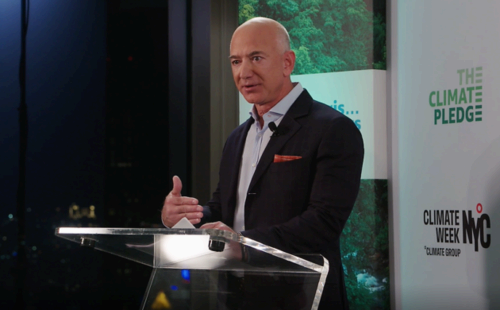
Did Jeff Bezos’ decision to leave Washington state for Miami have anything to do with taxes?
That’s one question to arise in the wake of the Amazon’s founder announcement Thursday that he’s taking his talents to South Beach.
Washington state lawmakers recently passed a controversial 7% capital gains tax for gains of $250,000 and up to fund early-childhood education programs and school construction. Bezos has sold billions in Amazon stock over the past several years.
The state for years has also debated different versions of a wealth tax. With a net worth of $160 billion, Bezos would be impacted as a Washington state resident.
Advocates of those taxes say it’s a way that Washington’s regressive tax laws can be altered to help low-wage earners. Opponents warned that the capital gains tax would cause businesses to leave the region.
Bezos, who moved to the Seattle region to launch Amazon in 1994, said he’s relocating to Miami — where he graduated high school — to be closer to his parents. He also cited his space venture Blue Origin and its operations in Florida. He did not mention taxes.
Florida, like Washington state, does not have an income tax. It also does not have a capital gains tax.
But Bezos’ move to Miami “isn’t a repudiation of tax policy in Washington state, nor is it a sign that Florida has created the policy recipe for others to follow,” writes Bloomberg columnist Jonathan Levin. He adds: “By and large, it really does seem to be mostly personal.”
Levin cites research from economist Cristobal Young, who published a study in 2016 that found most wealthy people don’t move to avoid paying high taxes.
Young did, however, publish another study last year stating that “once pandemic restrictions arrived, households began questioning the value of living in expensive, high-tax states.”
Jared Walczak, vice president of state projects at the think tank Tax Foundation, wrote Friday that “a Washington state revenue official was probably moved to tears” with Bezos’ announcement.
Walczak said the move is going to be “particularly hard for the state to stomach” due to the potential sizable loss of collections on a hypothetical wealth tax.
“When a tax is so heavily concentrated on a few wealthy, highly mobile individuals, that’s what happens when just one person moves,” Walczak wrote. “And if the tax were ever adopted, others might follow.”
We’ve reached out to Washington state Sen. Noel Frame, who sponsored a wealth tax proposal this year, and will update this story if we hear back.
Bloomberg’s Levin wrote that “lobbyists tend to exploit anecdotes such as the Bezos move to fuel this narrative that high tax states face fiscal ruin if they don’t slash rates to pamper their wealthiest residents. That’s obviously not right.”
He added: “Wealthy entrepreneurs are products of their local communities. Whether that’s Seattle, San Francisco or New York, their success is partially a result of the networks they’ve nurtured in those very specific social and business ecosystems.”
Certainly, Bezos benefitted from growing Amazon in Seattle, where fellow giant Microsoft and other companies helped buoy what grew into a global tech hub that attracts top-tier talent from around the world.
Bezos’ ties to the Seattle region have diminished in recent years. Bezos and ex-wife MacKenzie Scott divorced in 2019 after 25 years of marriage, and he stepped down as Amazon’s CEO in 2021.
“I’ve lived in Seattle longer than I’ve lived anywhere else and have so many amazing memories here,” Bezos wrote in an Instagram post. “As exciting as the move is, it’s an emotional decision for me. Seattle, you will always have a piece of my heart.”

